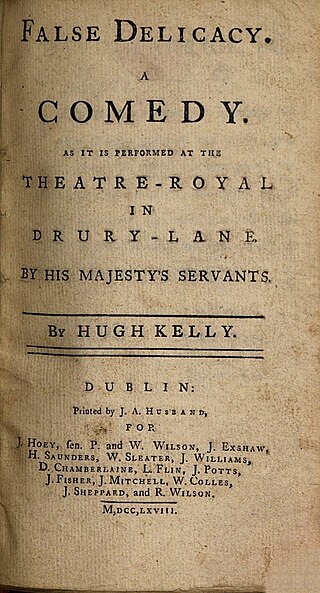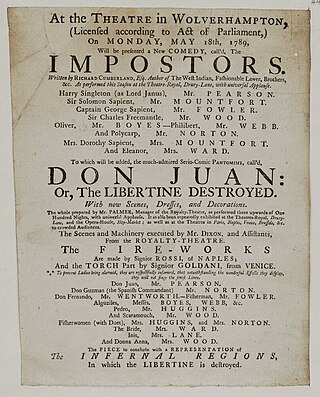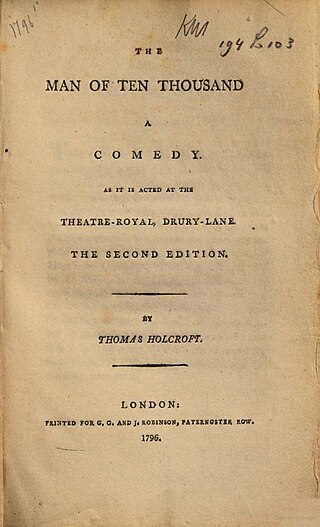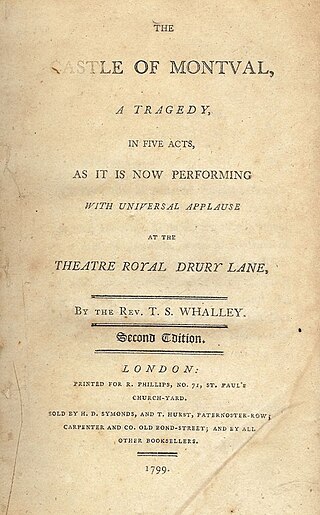
Ann Street Barry aka Ann Dancer later Ann Crawford, was a British singer, dancer and stage actress.
Hugh Kelly was an Irish dramatist and poet. From the 1760s he was employed as a propagandist for the British government, attacking members of the Opposition. After arriving in London in 1760 to work as a staymaker, he soon turned to become a writer and made a living as a journalist. In 1766 he published Thespis, a long poem about the acting profession, which gained him wide attention. He followed up this success with the novel Memoirs of a Magdalen in 1767. He ultimately became known for his stage plays such as False Delicacy and A Word to the Wise.
Francis Aickin, was an Irish actor, who worked at the Edinburgh Theatre in Scotland, and the between 1765 and 1792 in theatres in the West End of London.
James Aickin, was an Irish stage actor who worked at the Edinburgh Theatre in Scotland and in theatres in the West End of London.

False Delicacy is a 1768 comedy play by the Irish playwright Hugh Kelly, with some assistance by David Garrick. It premiered at the Drury Lane Theatre on 23 January. The play was a major success for Kelly, being performed over twenty times during its first season and selling ten thousand printed copies within a year. It was subsequently translated into German, French and Portuguese.
Memoirs of a Magdalen is a 1767 British novel by the Irish writer Hugh Kelly. Its full title is Memoirs of a Magdalen, or the History of Louisa Mildmay.

The West Indian is a play by Richard Cumberland first staged at the Drury Lane Theatre in 1771. A comedy, it depicts Belcour, a West Indian plantation owner, travelling to Britain. Belcour tries to overcome his father's lingering disapproval of him and marry his sweetheart Louisa. Its hero, who probably owes much to the suggestion of David Garrick, is a young scapegrace fresh from the tropics, "with rum and sugar enough belonging to him to make all the water in the Thames into punch", a libertine with generous instincts, which prevail in the end. The early example of the modern drama was favorably received. Boden translated it into German, and Goethe acted in it at the Weimar court.

The Impostors is a comedy play by Richard Cumberland. It was first performed at the Drury Lane Theatre in January 1789. The plot closely resembled that of The Beaux' Stratagem by George Farquhar.

The Battle of Hastings is a 1778 play by the English writer Richard Cumberland. It is a tragedy set around the Battle of Hastings in 1066. It was staged at the Drury Lane Theatre in October 1778 by Richard Brinsley Sheridan. Sheridan later mocked Cumberland's sensitivity to criticism by modelling the character Sir Fretful Plagiary, in his 1779 play The Critic, after him.

The Heiress is a comedy play by the British playwright and soldier John Burgoyne. The play debuted at the Drury Lane Theatre on 14 January 1786. It concerns the engagement of Lord Gayville to Miss Alscrip, a fashionable woman he believes to be an heiress. Gayville later discovers that the woman who really stands to inherit the fortune is his true love Miss Clifford. The play was an enormous success, running for 31 performances in its initial season and being revived again the following year. The play was initially anonymous, but Burgoyne was soon widely reported to be the author and he acknowledged this after the play's debut.

A Word to the Wise is a 1770 comedy play by the Irish writer Hugh Kelly. It was his second work after the 1767 hit False Delicacy. Kelly was known as a supporter of the government, and an opponent of the radical John Wilkes. During the second performance of the play a riot broke out amongst Wilkes' supporters at the Drury Lane Theatre and the play was subsequently withdrawn. When it was published instead Kelly wrote a long introduction defending himself and complaining about political prejudice. It was the first play performed at The Theatre, Leeds when it was opened on 24 May 1771. It was later staged by the American Company in North America.
Samuel Reddish (1735–1785) was a theatre manager and an actor in England. He made a reputation with Mossop's company in Smock Alley, Dublin in the seasons of 1761-2 and appeared at Drury Lane, London, 1767, where he remained during ten seasons; acted at Covent Garden, London, 1778, but lost his reason, 1779; he died a lunatic at York asylum on 31 December 1785.
Samuel Cautherley (c.1747–1805) was a British stage actor. His surname is sometimes spelt as Cautherly.

Braganza is a 1775 tragedy by the Irish writer Robert Jephson. It portrays the overthrow of Spanish rule in Portugal during the seventeenth century, leading to the establishment of the Braganza Dynasty. The original Drury Lane cast included Mary Ann Yates as Duchess, William Smith as Velasquez, John Palmer as Ribiro, James Aickin as Almada, John Hayman Packer as Ramirez, William Brereton as Mendoza, Howard Usher as Lemos, Richard Hurst as Corea, James Wrighten as Antonio and Samuel Reddish as Duke. The prologue was written by Arthur Murphy.
A Word for Nature is a 1798 comedy play by the British writer Richard Cumberland. It is also known by the alternative title of The Passive Husband.

The Fatal Discovery is a 1769 tragedy by the British writer John Home. It premiered at the Theatre Royal, Drury Lane in London. The original cast included Spranger Barry as Ronan, Samuel Reddish as Orellan, Francis Aickin as Connan, John Palmer as Durstan, Thomas Jefferson as Kathul, James Aickin as Euran and Ann Street Barry as Rivine.

The Man of Ten Thousand is a 1796 comedy play by the British writer Thomas Holcroft.

The East Indian is a 1799 comedy play by the British writer Matthew Lewis. It premiered at the Theatre Royal, Drury Lane on 22 April 1799. It was partly inspired by characters from Frances Burney's Cecilia while the playbill advertised it as being inspired by the 1790 play Die Indianer in England by August von Kotzebue. The original Drury Lane cast included Robert Palmer as Lord Listless, William Barrymore as Modish, John Philip Kemble as Rivers, Charles Kemble as Beauchamp, James Aickin as Walsingham, Ralph Wewitzer as Friponeau, Thomas Hollingsworth as Squeez'em, John Bannister as Frank, Jane Powell as Mrs. Ormond, Dorothea Jordan as Zorayda and Charlotte Tidswell as Mrs. Blaball. Lewis had written the play several years earlier, and it was published in 1800 by John Bell.

The Castle of Montval is a tragedy by the British writer Thomas Sedgwick Whalley. It was first published in 1781, but wasn't staged in London's West End until 23 April 1799 when it appeared at the Theatre Royal, Drury Lane where it succeeded The East Indian by Matthew Lewis. The Drury Lane cast included Sarah Siddons as Countess of Montval, John Philip Kemble as the Old Count, James Aickin as Count of Colmar, Charles Holland as Count of Montval, Charles Kemble as Marquis of Vaublane, William Barrymore as Lapont, John Hayman Packer as Blaise, Jane Powell as Matilda and Elizabeth Heard as Teresa. It was part of the tend of Gothic plays popular during the era.

Pizarro is a 1799 historical tragedy by Richard Brinsley Sheridan. It was inspired by August von Kotzebue's play Die Spanier in Peru, based on the Spanish conquest of the Inca Empire in 1532 by Francisco Pizarro. It premiered at the Theatre Royal, Drury Lane in London on 24 May 1799.













